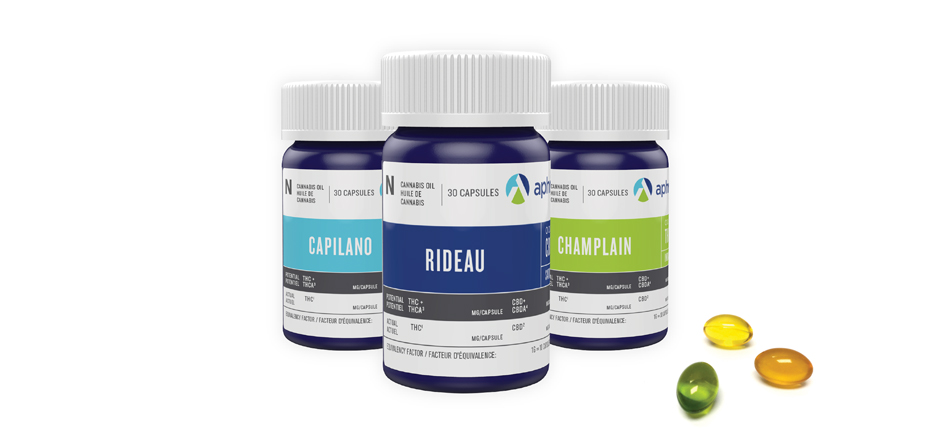Cannabis Oil Softgels: Why They May Be a Good Option for You

PAID CONTENT
If the words “medical cannabis” evoke images of smoke and green buds, you aren’t alone. However, since the first access was granted to cannabis for medical purposes in 2001, new options have been developed to further meet patients’ needs beyond dried cannabis. Cannabis oils, which offer patients a smoke-free option as well longer lasting effects¹, have been used by medical patients for many years. Recently, Aphria’s patients have an additional option for consuming their medicine: their cannabis oils are now available in convenient softgel capsules.
What are Cannabis Oil Softgels?
Aphria’s cannabis oils are produced using CO2 extraction, and diluted into non-allergenic MCT (medium chain triglyceride) oil. These ready-to-consume oils are enclosed in an easy to swallow² gelatine capsule. Because the oil is sealed within the capsule, the softgels are flavourless, odourless, and mess-free, making them a convenient, discreet way for patients to transport and consume their medication.
Ingested cannabis products, such as cannabis oils and softgels, are slower to take effect (1-2 hours) and last longer (6-8 hours) than the effects of cannabis that is inhaled by smoking or vapourizing¹. For this reason, cannabis oils and softgels may be a better choice for treating chronic conditions (symptoms that develop over time and are persistent), such as chronic pain and arthritis.³,⁴
Softgel Product Options
The expected therapeutic effects of medical cannabis are tied to the active ingredients, known as cannabinoids, found in that product. CBD (cannabidiol) and THC (delta-9-tetrahydrocannabinol) are the most well-known and well-studied cannabinoids in medical cannabis. Aphria’s softgels are pre-measured to a provide a specific dose of THC, CBD or both. Aphria’s softgels are available in regular and extra-strength, so that patients can choose the dose best suited to their medical needs.
THC is the compound known for the feeling of intoxication and euphoria associated with being “high”. Aphria’s patients report using products high in THC to treat symptoms of pain (47%) and sleeplessness (23%)⁵. CBD is non-intoxicating, and as a result often chosen for daytime use. Aphria’s patients most commonly report using high CBD products to treat pain (66%) and anxiety (20%)⁶. Some studies show that CBD can decrease potential unwanted side effects that may be caused by THC⁷,⁸ – patients that are seeking the therapeutic effects of THC may wish to start with a balanced product.
Aphria’s Quality Promise
Like all of their products, Aphria’s softgels are backed by their Seed-to-Sale Certified quality guarantee, that ensures the standards for cleanliness and safety of all their products. Delivering an expertly crafted product has been at the foundation of Aphria’s business, and they hold themselves to high standards when it comes to the cultivation and production of medical cannabis.
If medical cannabis interests you, talk to your doctor. Your doctor will help to determine if medical cannabis is a good option for you, taking into consideration your medical history, current prescription regimen and dosing schedule. For a complete list of prescribing physicians in your area, contact Aphria’s Patient Care team. To learn more, visit aphria.ca.
1. Duration of the desired effects of ingested cannabis. Health Canada, July 2016. Access to Cannabis for Medical Purposes Regulations – Daily Amount Fact Sheet (Dosage). [online]
2. 98% of patients survey found the softgels physical size to be just right, as reported in a survey to 261 softgel patients, when asked “How did you find the physical size of the softgels?”
3. MacCallum and Russo (2018) Practical consideration in medical cannabis administration and dosing. European Journal of Internal Medicine 49:12-19.
4. Weber et al. (2009) Tetrahydrocannabinol (Delta 9-THC) treatment in chronic central neuropathic pain and fibromyalgia patients: Results of a multicenter survey. Anesthesiology Research and Practice. Doi:10.1155/2009/827290
5. As reported in a survey of 3,793 registered Aphria patients, when asked “What is the primary symptom you are treating with medical cannabis? Please select only ONE primary symptom.” 1,399 patients reported using THC-dominant Aphria products (Mohawk, Henik, Limerick, Bienville, Sachigo, Grower’s Blend, Champlain Indica, Champlain Sativa).
6. As reported in a survey of 3,793 registered Aphria patients, when asked “What is the primary symptom you are treating with medical cannabis? Please select only ONE primary symptom.” 1,399 patients reported using CBD-dominant Aphria products (Tremblant, Rideau).
7. Robson PJ (2014) Therapeutic potential of cannabinoid medicines. Drug Test. Anal. 6(1-2):24-30.
8. Zuardi, et al. (1982). Action of cannabidiol on the anxiety and other effects produced by 9-THC in normal subjects. Psychopharmacology 76(3):245-250.
